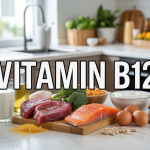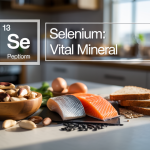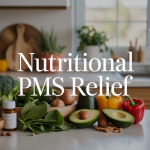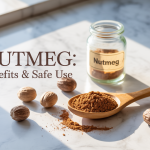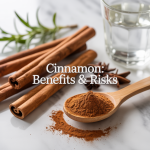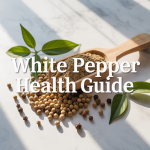Selenium: A Vital Mineral for the Body
Most people know about vitamins like C and D, but selenium often flies under the radar despite being essential for your health. This trace mineral works behind the scenes to protect your cells, support your immune system, and keep your thyroid running smoothly.
This guide is for anyone who wants to understand how selenium impacts their health and make sure they’re getting enough of this important nutrient. Whether you’re dealing with fatigue, want to boost your immunity, or simply care about optimal nutrition, you’ll find practical information here.
We’ll explore how selenium functions in your body and why it’s so important for your overall health. You’ll also discover the best food sources to include in your diet and learn about proper dosing if you’re considering supplements.
Essential Functions of Selenium in Your Body
Powerful Antioxidant Protection Against Cell Damage
Selenium acts as your body’s cellular bodyguard, working tirelessly to protect your cells from harmful free radicals. This mineral forms the backbone of glutathione peroxidase, one of your body’s most important antioxidant enzymes. Think of glutathione peroxidase as a cleanup crew that neutralizes dangerous molecules before they can damage your DNA, cell membranes, and proteins.
Free radicals constantly bombard your cells from pollution, stress, UV radiation, and normal metabolic processes. Without adequate selenium, these unstable molecules run wild, accelerating aging and increasing disease risk. Research shows that selenium’s antioxidant power extends beyond basic protection—it helps regenerate other antioxidants like vitamin C and vitamin E, creating a powerful defensive network.
The mineral also supports selenoproteins, specialized proteins that regulate oxidative stress throughout your body. These proteins patrol your cells, identifying and neutralizing threats before they cause lasting damage. Studies reveal that people with higher selenium levels show reduced markers of cellular damage and inflammation.
Immune System Strengthening and Disease Prevention
Your immune system relies heavily on selenium to function at peak performance. This mineral supercharges white blood cells, enhancing their ability to identify and destroy harmful bacteria, viruses, and other pathogens. Selenium deficiency weakens immune responses, making you more susceptible to infections and slower to recover from illness.
Research demonstrates that adequate selenium intake reduces the severity and duration of viral infections, including common colds and flu. The mineral also plays a crucial role in vaccine effectiveness—people with sufficient selenium levels develop stronger antibody responses to vaccinations.
Selenium’s immune-boosting effects extend to cancer prevention. Multiple studies show that higher selenium status correlates with reduced risk of certain cancers, particularly prostate, lung, and colorectal cancers. The mineral helps prevent DNA mutations that can lead to tumor formation while supporting the immune system’s ability to detect and eliminate abnormal cells.
Autoimmune conditions also respond positively to optimal selenium levels. People with rheumatoid arthritis and other inflammatory conditions often show improvement when selenium deficiency is corrected.
Thyroid Hormone Regulation and Metabolism Support
Selenium concentration in your thyroid gland exceeds that of any other organ, highlighting its critical role in thyroid function. This mineral is essential for producing and converting thyroid hormones, which control your metabolism, energy levels, body temperature, and weight management.
The thyroid produces thyroxine (T4), an inactive hormone that must be converted to the active form, triiodothyronine (T3). Selenium-dependent enzymes called deiodinases perform this crucial conversion. Without sufficient selenium, your body struggles to produce adequate active thyroid hormone, leading to symptoms like fatigue, weight gain, brain fog, and depression.
Selenium also protects your thyroid from oxidative damage during hormone production. The thyroid generates hydrogen peroxide as part of hormone synthesis, and without selenium’s protective effects, this process can damage thyroid tissue. Chronic selenium deficiency contributes to thyroid disorders, including Hashimoto’s thyroiditis and goiter.
People living in selenium-deficient regions show higher rates of thyroid problems, while supplementation in these areas often improves thyroid function and reduces thyroid antibodies in autoimmune conditions.
Heart Health and Cardiovascular Protection
Selenium’s cardiovascular benefits stem from its powerful antioxidant and anti-inflammatory properties. The mineral helps prevent the oxidation of LDL cholesterol, a key step in atherosclerosis development. When LDL cholesterol becomes oxidized, it’s more likely to stick to artery walls, forming dangerous plaques that can lead to heart attacks and strokes.
Studies show that people with higher selenium levels have reduced risk of heart disease and better overall cardiovascular health. The mineral also supports healthy blood pressure by promoting proper blood vessel function and reducing inflammation in arterial walls.
Selenium deficiency has been linked to a specific type of heart disease called Keshan disease, primarily found in areas with selenium-poor soil. This condition causes heart muscle deterioration and can be fatal if left untreated. Selenium supplementation in affected regions has virtually eliminated this disease.
The mineral also helps regulate homocysteine levels, an amino acid that can damage blood vessels when elevated. Additionally, selenium supports the production of coenzyme Q10, a vital nutrient for heart muscle energy production and protection against oxidative stress.
Top Food Sources Rich in Selenium

Brazil Nuts: Nature’s Selenium Powerhouse
Brazil nuts stand out as the most concentrated natural source of selenium available. Just one ounce of Brazil nuts delivers approximately 544 micrograms of selenium, which far exceeds the daily recommended intake. This extraordinary concentration comes from the selenium-rich soil of the Amazon rainforest where these trees grow.
The selenium content in Brazil nuts can vary significantly depending on the soil conditions where they were grown. Some nuts may contain up to 90 micrograms per nut, while others might have less. Because of this variability, eating just 1-2 Brazil nuts daily provides adequate selenium for most people without risking excessive intake.
These nuts offer additional nutritional benefits beyond selenium, including healthy fats, protein, magnesium, and vitamin E. Their creamy texture and mild flavor make them easy to incorporate into daily meals as snacks, in trail mixes, or ground into smoothies.
Seafood and Fish High in Selenium Content
Ocean-dwelling fish and shellfish naturally accumulate selenium from seawater, making them excellent dietary sources. Tuna ranks among the top selenium-rich fish, with a 3.5-ounce serving of yellowfin tuna providing about 92 micrograms of selenium.
| Seafood Type | Selenium Content (per 3.5 oz) |
|---|---|
| Yellowfin Tuna | 92 mcg |
| Sardines | 53 mcg |
| Salmon | 36 mcg |
| Shrimp | 35 mcg |
| Crab | 34 mcg |
| Lobster | 31 mcg |
Sardines deserve special mention as they’re not only rich in selenium but also sustainable and affordable. Canned varieties retain their selenium content while providing convenience for regular consumption. Shellfish like oysters, mussels, and clams also contribute meaningful amounts of selenium while delivering other essential minerals like zinc and iron.
Regular fish consumption provides multiple health benefits beyond selenium, including omega-3 fatty acids for heart and brain health. Wild-caught fish typically contain higher selenium levels than farm-raised varieties.
Meat and Poultry Options for Selenium Intake
Animal proteins serve as reliable selenium sources because livestock and poultry accumulate selenium from their feed and grazing areas. Beef liver tops the list among meat sources, containing approximately 28 micrograms per 3.5-ounce serving.
Chicken and turkey provide moderate selenium amounts, with skinless chicken breast delivering about 20 micrograms per serving. Ground turkey offers similar levels while being leaner than many beef options. Pork products, including lean cuts and organ meats, contribute valuable selenium to the diet.
Grass-fed and pasture-raised meats often contain higher selenium levels compared to conventional grain-fed animals. This difference stems from the selenium content in pasture grasses and the animals’ more diverse diet.
Organ meats like kidney and heart contain concentrated selenium amounts, though they’re less commonly consumed in modern diets. For those who enjoy them, these cuts provide exceptional nutritional density beyond just selenium.
Eggs from free-range chickens also contribute selenium, with one large egg providing approximately 15 micrograms. The selenium concentrates primarily in the egg white, making it beneficial even for those avoiding egg yolks.
Daily Selenium Requirements and Optimal Dosage
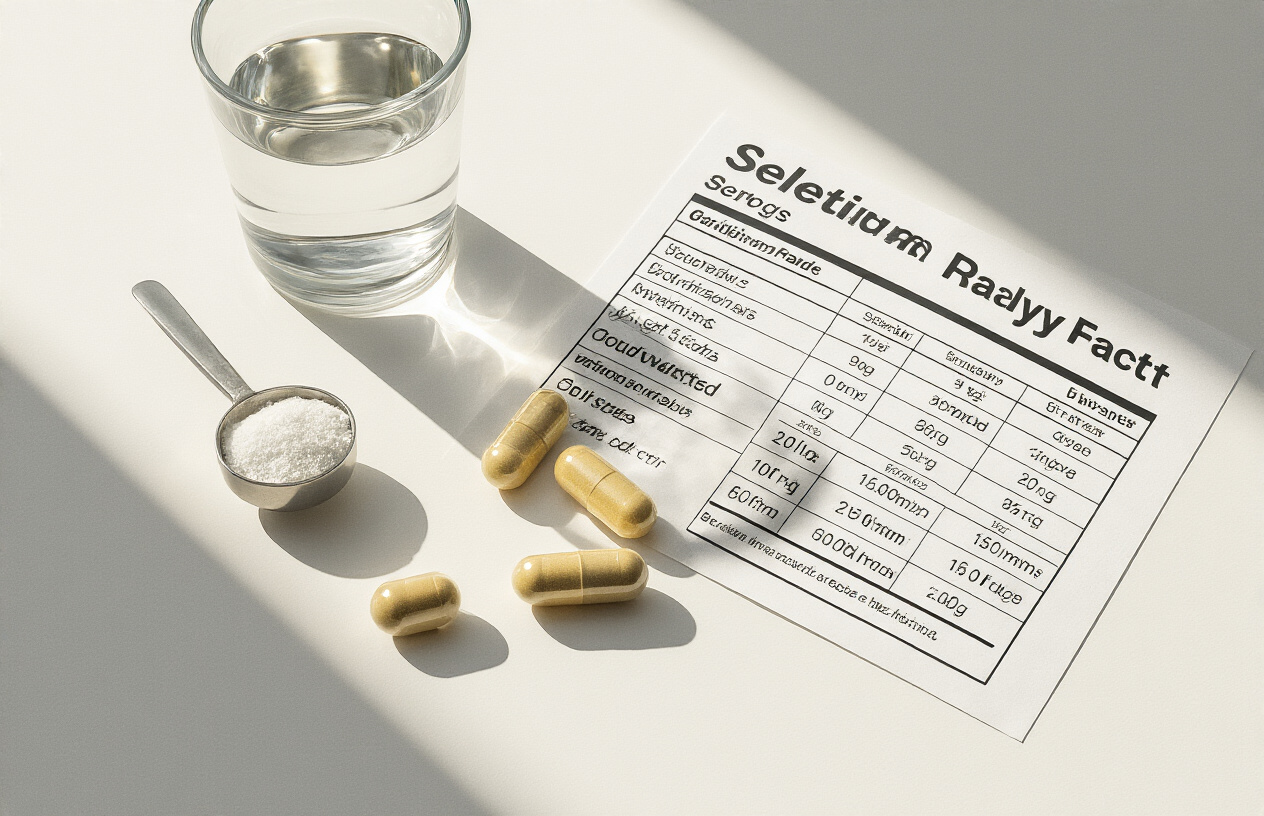
Recommended Daily Allowances by Age and Gender
The body needs different amounts of selenium depending on age, gender, and life stage. For healthy adults, the recommended daily allowance sits at 55 micrograms per day. This amount supports optimal thyroid function and provides adequate antioxidant protection for most people.
Children require less selenium as their bodies are smaller and developing. Infants up to 6 months need about 15 micrograms daily, while those 7-12 months require 20 micrograms. Toddlers aged 1-3 years need 20 micrograms, and children 4-8 years should get 30 micrograms daily. As kids grow into their teenage years, their selenium needs increase to 40 micrograms for ages 9-13, then jump to the adult level of 55 micrograms for those 14 and older.
| Age Group | Daily Selenium Requirement |
|---|---|
| 0-6 months | 15 mcg |
| 7-12 months | 20 mcg |
| 1-3 years | 20 mcg |
| 4-8 years | 30 mcg |
| 9-13 years | 40 mcg |
| 14+ years | 55 mcg |
Men and women share the same baseline requirement of 55 micrograms, though women’s needs change during pregnancy and breastfeeding periods.
Safe Upper Limits to Prevent Toxicity
While selenium is essential, too much can cause serious health problems. The tolerable upper intake level for adults is set at 400 micrograms per day. Going beyond this amount regularly can lead to selenosis, a condition marked by hair loss, nail brittleness, fatigue, irritability, and a metallic taste in the mouth.
Early signs of selenium toxicity include garlic breath odor, nausea, and diarrhea. More severe cases can cause nerve damage and heart problems. The gap between beneficial and toxic levels is relatively narrow compared to other minerals, making it important to monitor intake carefully.
Children have lower tolerance levels:
- Ages 1-3: 90 micrograms maximum
- Ages 4-8: 150 micrograms maximum
- Ages 9-13: 280 micrograms maximum
- Ages 14-18: 400 micrograms maximum
Most people get adequate selenium from food alone, making toxicity rare from dietary sources. Problems typically arise from taking high-dose supplements or living in areas with extremely selenium-rich soil.
Special Considerations for Pregnant and Nursing Women
Pregnancy increases selenium requirements to support fetal development and maintain maternal health. Pregnant women need 60 micrograms daily, just 5 micrograms more than the standard adult recommendation. This modest increase reflects selenium’s role in proper fetal brain development and immune system formation.
Breastfeeding mothers require the highest amount at 70 micrograms per day. Breast milk naturally contains selenium, and maintaining adequate maternal levels ensures babies receive enough through nursing. Low maternal selenium can reduce the mineral content in breast milk, potentially affecting infant development.
Getting enough selenium during pregnancy supports:
- Proper thyroid hormone production
- Immune system function
- Protection against oxidative stress
- Healthy fetal brain and nervous system development
Pregnant and nursing women should focus on selenium-rich foods rather than supplements unless specifically recommended by their healthcare provider. Brazil nuts, seafood, and selenium-enriched grains provide safe, natural sources.
Athletes and High-Stress Lifestyle Selenium Needs
People with demanding physical routines or high-stress lifestyles may benefit from slightly higher selenium intake. Intense exercise creates more free radicals in the body, and selenium helps neutralize this oxidative stress through its role in antioxidant enzymes.
Athletes often have higher metabolic rates and increased nutrient turnover, potentially raising their selenium requirements above standard recommendations. Research suggests that people engaged in regular intense training might benefit from 70-100 micrograms daily, though this should stay well below the 400-microgram safety limit.
High-stress environments, whether physical or mental, can deplete selenium stores more rapidly. Chronic stress affects hormone production and immune function, both areas where selenium plays important roles. People in high-pressure jobs or dealing with ongoing stress might consider monitoring their selenium status through blood tests.
Signs that active individuals might need more selenium include:
- Slower recovery from workouts
- Frequent minor illnesses
- Persistent fatigue despite adequate rest
- Poor mood or increased irritability
Rather than automatically taking supplements, athletes and stressed individuals should first evaluate their dietary selenium intake and consider adding selenium-rich whole foods to their meals.
Health Consequences of Selenium Deficiency

Weakened Immune Function and Increased Infections
Selenium deficiency creates a domino effect that weakens your body’s natural defense system. When selenium levels drop too low, your immune cells can’t produce enough selenoproteins—specialized proteins that act like bodyguards for your white blood cells. Without adequate protection, these immune warriors become vulnerable to damage from free radicals, making them less effective at fighting off invaders.
Research shows that people with selenium deficiency experience more frequent respiratory infections, longer recovery times from illnesses, and reduced vaccine effectiveness. Your body’s ability to produce antibodies also takes a hit, leaving you more susceptible to bacterial and viral infections. Children with low selenium levels often catch colds and flu more frequently than their peers with optimal selenium status.
The mineral plays a crucial role in regulating inflammatory responses too. Without enough selenium, your immune system might overreact to threats, creating chronic inflammation that actually weakens your overall immunity. This creates a vicious cycle where your body wastes energy fighting unnecessary battles instead of focusing on real threats.
Thyroid Disorders and Metabolic Disruptions
Your thyroid gland contains more selenium per gram than any other organ in your body, and for good reason. Selenium-dependent enzymes are essential for converting inactive thyroid hormone (T4) into active thyroid hormone (T3). When selenium levels drop, this conversion process slows down dramatically, leading to symptoms that mirror hypothyroidism.
People with selenium deficiency often experience unexplained weight gain, persistent fatigue, brain fog, and cold intolerance. Their metabolism essentially shifts into slow gear, making it difficult to maintain healthy body weight or feel energetic throughout the day. Hair loss and dry skin are also common complaints, as the thyroid’s reduced function affects cellular renewal processes.
Selenium deficiency can trigger autoimmune thyroid conditions like Hashimoto’s thyroiditis. Without adequate selenium, the thyroid becomes more vulnerable to oxidative stress and inflammatory damage. Studies from areas with naturally low soil selenium content show significantly higher rates of thyroid disorders compared to selenium-rich regions.
The metabolic disruptions extend beyond thyroid function. Selenium deficiency affects insulin sensitivity and glucose metabolism, potentially contributing to blood sugar imbalances and increased diabetes risk.
Increased Cancer Risk and Cellular Damage
Selenium acts as your cells’ personal security system, and when levels drop, cellular damage accumulates rapidly. The mineral supports multiple antioxidant enzymes that neutralize harmful free radicals before they can damage DNA. Without this protection, cells become more likely to develop cancerous mutations.
Population studies reveal striking patterns: regions with naturally low selenium levels in soil and water show higher rates of certain cancers, particularly prostate, lung, and colorectal cancers. The link is so strong that researchers consider selenium status a significant factor in cancer prevention strategies.
Selenium deficiency compromises your body’s ability to repair damaged DNA and eliminate abnormal cells. The mineral supports enzymes that help cells recognize and destroy potentially cancerous cells before they multiply. When selenium levels are inadequate, these quality control mechanisms fail, allowing damaged cells to survive and potentially become malignant.
The antioxidant protection selenium provides extends to protecting cell membranes, proteins, and genetic material from oxidative damage. This damage accumulation accelerates aging processes and increases vulnerability to various chronic diseases beyond cancer, including cardiovascular disease and neurodegenerative conditions.
Selenium Supplementation Benefits and Best Practices
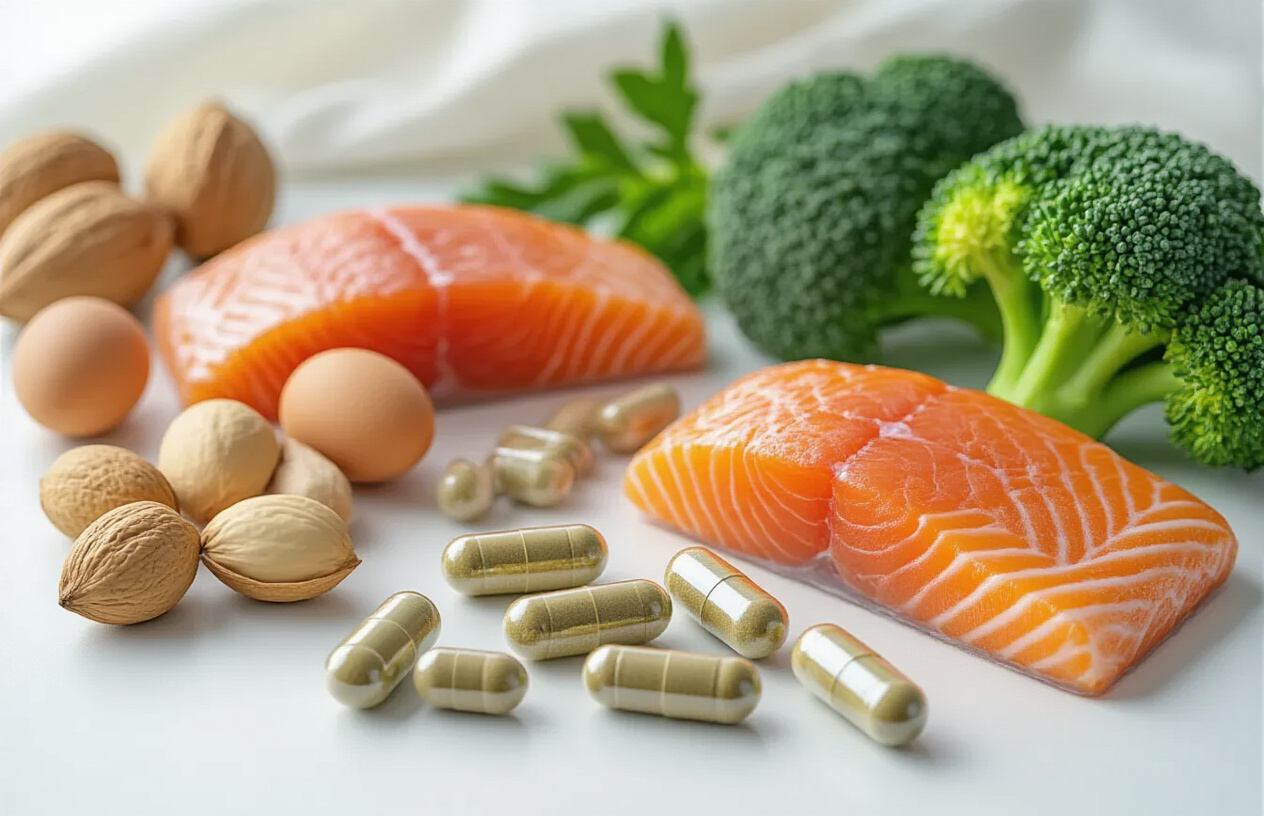
When to Consider Selenium Supplements
Most people get enough selenium through their regular diet, especially if they eat Brazil nuts, seafood, or meat regularly. However, certain situations call for supplementation. If you live in an area with selenium-poor soil (common in parts of Europe, China, and New Zealand), your food sources might not provide adequate amounts. People following strict vegan diets, those with digestive disorders like Crohn’s disease or celiac disease, and individuals on dialysis often need extra selenium support.
Pregnant and breastfeeding women may benefit from supplements, as their selenium needs increase. If you’re dealing with thyroid issues, immune system challenges, or chronic inflammation, your doctor might recommend selenium supplements as part of your treatment plan. Hair loss, muscle weakness, and frequent infections can signal selenium deficiency, making supplementation worthwhile.
Different Forms of Selenium Supplements Available
Selenium supplements come in several forms, each with different absorption rates and benefits. Here’s what you’ll find on the market:
| Form | Absorption Rate | Best For |
|---|---|---|
| Selenomethionine | High (90%) | General supplementation |
| Sodium selenite | Moderate (50%) | Targeted therapeutic use |
| Selenium yeast | High (85%) | Natural preference |
| Selenocysteine | High (95%) | Maximum bioavailability |
Selenomethionine is the most popular choice because your body recognizes it as a natural amino acid. Selenium yeast offers a food-based option that many people prefer. Sodium selenite works well for specific health conditions but doesn’t absorb as easily. Selenocysteine provides the highest bioavailability but costs more than other forms.
Optimal Timing and Absorption Enhancement Tips
Taking selenium at the right time maximizes its benefits. Your body absorbs selenium best on an empty stomach, so consider taking it first thing in the morning or between meals. However, if you experience stomach upset, take it with a small snack.
Vitamin E enhances selenium absorption and function, making them excellent partners. Taking them together amplifies their antioxidant effects. Avoid taking selenium with high-fiber foods or calcium supplements, as these can interfere with absorption.
Split larger doses throughout the day rather than taking everything at once. Your body processes smaller amounts more efficiently. Consistency matters more than perfect timing – pick a routine you can stick with daily.
Store your supplements in a cool, dry place away from direct sunlight. Heat and moisture can degrade selenium’s potency over time.
Potential Drug Interactions and Safety Precautions
Selenium interacts with several medications and nutrients, so awareness prevents problems. Blood thinners like warfarin may become more potent when combined with selenium supplements. If you take these medications, work closely with your healthcare provider to monitor your levels.
Chemotherapy drugs, particularly cisplatin, can interact with selenium. While some studies suggest selenium might protect against certain side effects, timing and dosage become critical factors that require medical supervision.
Taking too much selenium causes selenosis, a condition marked by hair loss, nail brittleness, garlic breath, and neurological symptoms. The upper limit sits at 400 micrograms daily for adults – exceeding this regularly leads to toxicity.
People with autoimmune thyroid conditions need special caution. While selenium can help Hashimoto’s thyroiditis, it might worsen hyperthyroid conditions like Graves’ disease. Kidney disease patients should avoid supplements unless specifically prescribed, as their bodies can’t eliminate excess selenium effectively.
Always inform your healthcare providers about selenium supplementation before surgeries, as it can affect blood clotting and interact with anesthesia medications.

Selenium plays a crucial role in keeping your body healthy and functioning at its best. From supporting your immune system and thyroid function to acting as a powerful antioxidant that fights off harmful free radicals, this trace mineral deserves more attention in your daily nutrition planning. Getting enough selenium through foods like Brazil nuts, seafood, and whole grains can help protect you from deficiency-related health issues and support your overall well-being.
The good news is that meeting your daily selenium needs doesn’t have to be complicated. Most people can get adequate amounts through a balanced diet, though supplements may be helpful for those with specific health conditions or dietary restrictions. Start by adding selenium-rich foods to your meals and pay attention to how your body responds. If you’re considering supplements, talk with your healthcare provider to determine the right approach for your individual needs and avoid the risks that come with taking too much of this powerful mineral.
